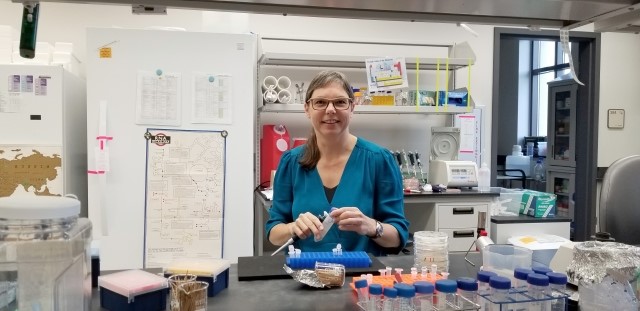Researchers discover insights into cellular surveillance pathway that may have implications for cancer treatment

The more complex a system is, the more likely it is to break, simply because there are more potential breaking points.
How does a complex system, like a cell undergoing cell division, ensure that it survives and remains healthy?
Silke Hauf, an associate professor of biological sciences in the College of Science at Virginia Tech, studies a cellular surveillance pathway, or a cellular "checkpoint," that prevents cells from acquiring the wrong number of chromosomes.
"This checkpoint delays cell division until any errors are repaired. But cancer cells, although capable to activate the pathway, are more prone to escape the surveillance and produce abnormal daughter cells," explained Hauf, a Biocomplexity Institute Fellow and an affiliated faculty member of the Fralin Life Science Institute.
To understand how this checkpoint protects dividing cells and how cancer cells escape this control, the Hauf lab recently teamed up with Andrea Ciliberto and his research group in Milan, who are experts in computational modeling.
Last year, the two groups met for a retreat in northern Italy to exchange research findings and to discuss their respective results during hikes and communal cooking.
During the discussions, a picture emerged that cancer cells may escape surveillance by accumulating more of a protein that is targeted by the checkpoint.

Human cancer cells in culture, with a dividing cell in the middle surrounded by non-dividing cells. Image courtesy of Silke Hauf.
"But not all cells show the same response to this extra protein, which puzzled us," said Ciliberto.
By computationally modeling the pathway, the U.S.-Italian team identified one crucial reaction in the network that determines whether the pathway response is weakened by accumulation of the target protein or not.
This research was recently published in PLoS Computational Biology.
"This is exciting, because our findings suggest that modulating this single reaction with drugs may tune the pathway," explained Hauf.
The researchers predict that reinforcing the reaction may kill cancer cells that have accumulated more of the target protein but still allow other cells to divide normally.
"How to target dividing cancer cells but not other dividing cells in the body is a recurrent problem in cancer therapy," said Hauf.
Unfortunately, this does not mean the problem is solved. "Finding such a drug will be extremely challenging," said Ciliberto. Nevertheless, the new results will make it easier to predict how this checkpoint responds to any interference.
The groups are now planning another retreat - this time in the mountains around Blacksburg - to hash out the next steps. For Ciliberto, this would be a return, since he spent several years in Blacksburg as a post-doctoral fellow in the group of John Tyson, a University Distinguished Professor in biological sciences.
For now, the groups have picked slightly different questions to follow but they expect the results to be complementary. Hauf’s group is exploring how cells control the concentration of checkpoint proteins and target protein. Ciliberto’s lab has started to focus on the cells that accumulate the target protein and what makes them so successful that they can outcompete normal cells.
Both Hauf and Ciliberto are sure: "More questions will come up once we start cooking."


